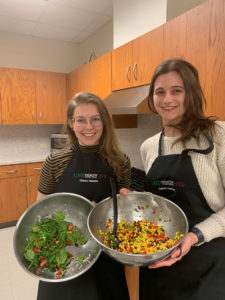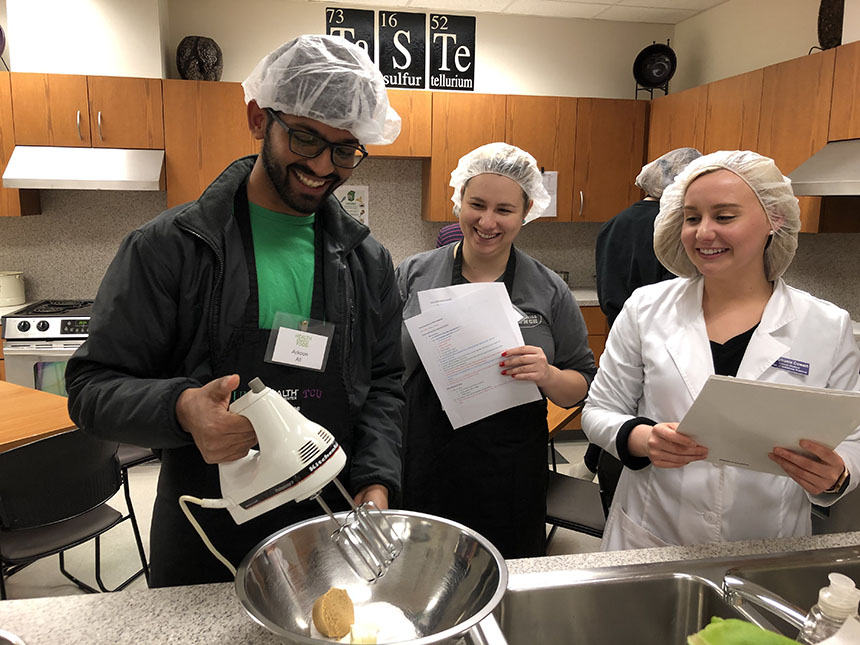For HSC students, Culinary Medicine Class is more than just a meal
Samar Taqvi wanted to do it for her father. Sadie Thompson and Heidi Spann wanted to expand their versatility in rural areas of Texas where they’ll eventually practice medicine.
The Culinary Medicine Class is a six-week course that emphasizes the importance of nutritious and delicious food in fostering good health. But it’s also about friendships, opportunities and collaboration among students from TCOM, HSC’s Physician Assistant Studies program and TCU’s Department of Nutritional Sciences.
What brought TCOM students Samar, Sadie and Heidi to the course is a unique circumstance for each of them, a dash of heartache, a sprig of optimism and a healthy serving of hope.
Life-saving diet
It’s the diagnosis nobody wants to hear. Cancer. For Asghar Taqvi, the father of Samar, that news came in October 2016. He had myelofibrosis, a rare form of Leukemia that affects the bone marrow. The news rocked the Taqvi family of five.
“I was devastated,” Samar Taqvi said. “I knew that I had to be strong for my family because we didn’t know what was going to happen.”
The long-term plan was a stem-cell transplant for her father. In the time being, the family wanted to help. Samar was taking pre-med classes at the University of Houston and only months away from taking the MCAT. The family started researching how they could help their father until the transplant, which was over a year away. It all came back to food.
“We started to ask, how can we help his bone marrow with food,” Samar said. “That’s when we started to incorporate food that was rich in folic acid like leafy greens and liver, which is really high in iron and B12.”
The entire family participated. Dinners included spinach, salad and liver, which under normal circumstances would never find its way to the table. But these weren’t normal circumstances.
“I don’t like eating liver,” Samar said with a laugh. “Me and my siblings were like, ‘Eww what is this?’ But we wanted to encourage and support our father so he didn’t feel like he was the only one having to eat this.”
The kitchen in the Taqvi house became a therapeutic refuge for Asghar during some of the down days.
“It helped us encourage him during those tougher days, because we could make breakfast together,” Samar said. “We snuck a few things onto his plate to help, but it also brought us closer together.”
The diet, support system and stem-cell transplant worked, and Asghar is now in remission. Samar felt comfortable enough to begin her journey through medical school and arrived at TCOM in 2019. When she heard about the Culinary Medicine Class, it was a natural fit.
“I’ve seen this, I’ve known this, and I want to be able to do this for my patients,” Samar said. “I want to see how much more there is in the world about culinary medicine not just for cancer patients, but being able to walk them through easy steps that can change their life through their diet. This class will really help me see their side of the situation so I can better understand what they are going through.”
Limited options
Life in rural towns doesn’t offer as many options as life in the big city, and diets are no exception. TCOM students who join the ROME program know that when they begin practice in a rural setting, they will be more than just an osteopathic physician. In some cases, they will be the town’s dietician.
That’s what drew TCOM students Sadie Thompson and Heidi Spann to the Culinary Medicine Class.
“In rural settings, patients aren’t going to have accessibility to a dietician, and I want to have that nutritional education, so I can act as their nutritionist in clinical setting,” Spann said.
“I’m from a small town in Louisiana,” Thompson said. “My family didn’t have the best nutritional practices, and I think some of that stems from not having a lot of access to that education. Seeing how that’s affected my family, I’ve realized how important nutrition is, especially in smaller towns.”
The class has opened up avenues for the students to pursue in the area of nutrition, but it also bridged the gap between trust and a healthy lifestyle.
“If you have personal experience with this, then the patient can relate to you on a personal level,” Thompson said. “This class has given me personal nutritional education and ideas how you can work with your patients on their diet.”
Working together
Now in her third-year running the course, Janet M. Lieto, DO, FACOFP, CMD, has built an interprofessional educational network with TCU’s Department of Nutrition that has benefited the students from both campuses.
The Culinary Medicine students are paired in the kitchen with dietician students from TCU, who are there to answer questions and guide the TCOM and PA students.
“They are real-life Google,” Spann said. “They do so much for us; they are a wealth of information. Being able to make these connections now could possibly help down the road. Due to the collaboration and relationships developed in this class, when I am practicing in a rural setting, I would be more than happy to call a nutritionist friend and gain their perspective to better help a patient.”
Dr. Lieto has emphasized the IPE opportunity to the students and urged them to take advantage of the chances to collaborate and broaden their knowledge that they can then take with them into the clinic.
“Our relationship with the TCU Department of Nutrition is really strong and because of that, the class and the program has continued to get better every year,” Dr. Lieto said. “I’m excited to watch the growth of the class and the students, who will take what they learn here and put it into practice.”







Social media